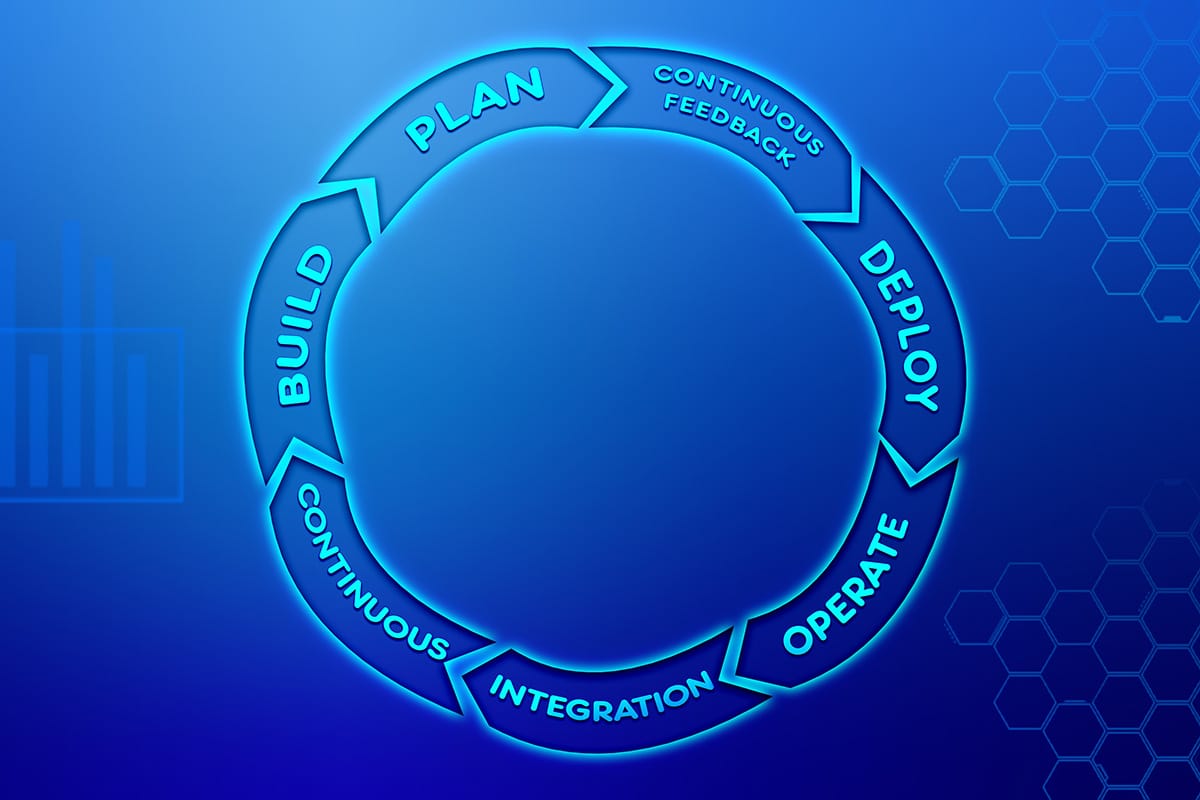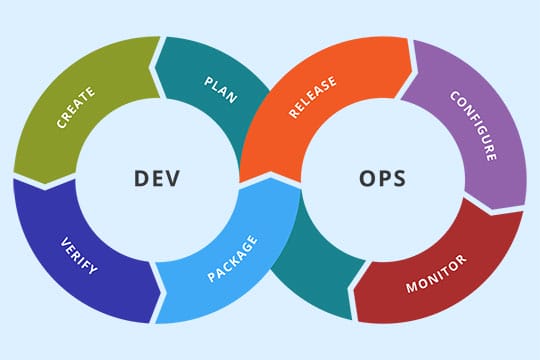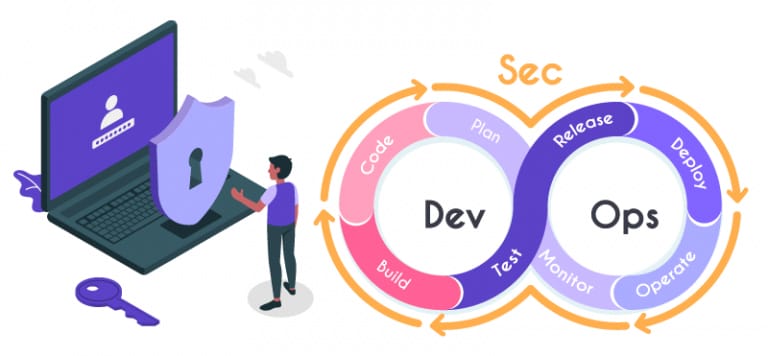As companies move to cloud services, understanding HIPAA compliance standards and requiring strict adherence to them is becoming the foundation for a reliable app. It is a necessity for gaining the trust of users who provide confidential health information. In this article, you will find out how to automate HIPAA compliance with DevOps and how your business can benefit from it?
HIPAA Compliance: How DevOps can Help?

Imagine a business where product owners, developers, testers, IT operations employees, and data security professionals work together not only to help each other but also to ensure the future success of the organization. By working towards a shared goal, they ensure the rapid implementation of planned results into production (performing tens, hundreds, even thousands of code deployments per day) while achieving high levels of stability, resilience, availability, and security.
In such a world, cross-functional teams are no doubt testing their assumptions about which functions will especially please users and serve the organization’s goals. They deliver the functionality the users want, proactively ensure the uptime and validation of the value chain, without causing IT operational chaos and disruption to any internal or external customers.
At the same time, testers, operations staff, and information security specialists are constantly trying to reduce mutual friction within the development team, creating systems that make it possible to act more productively and more efficiently. When procurement teams have automated tools (e.g., HIPAA compliance automation) and self-service platforms to work with, they can leverage them in their day-to-day work. This will make them dependent on other performers and bring them closer to the top in the competitive market struggle. These are the results of using DevOps.
Recommended for you: 7 DevOps Toolchain Orchestration Solution You May Not Know.
A Quick Take on HIPAA
Clinics, medical centers, and other healthcare institutions handle a large amount of personal data from both employees and customers. Many documents fall into the category of medical confidentiality. Therefore, information security in medicine is moving to a new level. The 1996 Health Insurance Portability and Accountability Act (HIPAA) is a federal law that establishes norms about who can see and receive your health information. This law gives you rights in relation to your health information and governs when such information may be shared.
Why Use DevOps for HIPAA Compliance?

The advantages of HIPAA compliance automation are numerous: workflow automation, improved exchange of data, instant problems detection, and prevention, streamlined reporting, etc. By employing DevOps practices accurately, you can guarantee that your personnel knows the correct foundation for building compliance. Rather than worrying about compliance after the app development stage is complete, you should follow DevOps principles from the outset of the app-building process.
Because DevOps removes the barriers that exist between development and operations teams, it’s becoming easier to make products compliant. During a traditional development process, only security teams are tasked with making apps HIPAA-compliant. With DevOps, everything changes: it makes everyone on the team (including development staff) work together to meet HIPAA compliance regulations.
Automating HIPAA Compliance with DevOps

Ensuring HIPAA-compliant app development leads to increased safety and active production. Migrating data and workflows to the cloud provide access to data and facilitate interoperability. Thus, working with data becomes easier, plus DevOps also manages its security. Once you decide to automate HIPAA compliance with DevOps, you will have to address several technical measures.
Planning

Planning plays a crucial role in helping stakeholders understand the technical solutions and collect decisive data on individual architectural features. The incorporation of DevOps can assist you at the initial planning stage of HIPAA compliance so that you build solid playbooks quickly.
Provisioning

Now you are ready to create the automation playbooks for IaaS implementation. It is better to select one of the services that support most of the prominent coding languages. The code is recognized by machines and interacts with the providers’ API front. Depending on the service provider you choose (AWS cloud provider, Azure, Google) the code may be cluster- or premise-based.
Constant Delivery

Companies can establish their healthcare service logbook after streamlining their playbooks. Next, they can utilize that playbook as a pattern/template for their HIPAA compliance settings. The playbook can contain a storage/server template, container configuration, and a predetermined software app.
Ensuring Safety

Standardizing and automating the environment, along with making API gateways safe is crucial if you want to reduce the risks of illegal access. Secure API gateways improve route clarity and support authorized-only access. Automating safety updates through the DevOps pipeline provides a documented changelog that will be helpful for the audit teams.
You may like: Top 10 Healthcare Technology Innovations We Have Witnessed!
Medical Data Security with DevSecOps

Image source: medium.com.
A HIPAA-compliant app means a secure app first and foremost. But to find out what HIPAA requires in terms of security, you need to look at 45 CFR Title 160, check 164 A and C sections. Even there, you will not find what you are looking for right away. You will have to read up to the technical precautions and audit controls section.
There you will see that first you need to define traceable patient information activities, then design and implement controls, select instruments, and only after that can you begin to collect and analyze the data you need. How exactly to meet this requirement is a matter of discussion between Compliance Officers, Data Protection, and DevOps teams.
Special attention should be paid to issues with pre-aversion, detection, and error correction. Sometimes problems arising during these procedures can be resolved by using the version control configuration options. And sometimes it’s a monitoring control problem.
You can implement one of these controls using AWS CloudWatch and then test that the tool is launched with a single line. In addition, you need to show where the logs are sent: ideally, you should put them in a common logging system, where you can link the audit evidence with the current control requirements.
DevOps to the Rescue
HIPAA compliance automation with DevOps is even more vital when it comes to secure health information. In standard development methods, the role of the security team usually manifests itself at the final stage of product creation, more precisely – when the app is ready for launch. DevOps-based healthcare apps have a much faster development speed than conventional development cycles, and security checks are included in the process itself.
As organizations gradually adopt DevOps practices, tensions between the IT industry and auditing are growing. New DevOps approaches challenge the traditional understanding of auditing, control, and risk reduction.
To automate HIPAA compliance with DevOps, you must first consider incorporating security into the DevOps (commonly called DevSecOps). This way you will be able to monitor the app’s security from the outset of the app base creation. According to Gartner’s study, by 2021, DevSecOps systems will be introduced in 60% of actively developing companies.
Image source: techwire.net.
DevOps benefits everyone, whether they are developers, operations engineers, testers, information security engineers, customers, or clients. It brings joy back to the development of important services. It enables different teams to work together to survive, learn, thrive, delight customers, and benefit from the company.
We have conducted an interview recently with Artem Dolobanko, a DevOps Engineer and the CEO of OpsWorks Co., regarding HIPPA compliance. You can consider him as an expert in this field. As he mentioned in his interview,
“One of the best tools to ensure HIPAA-compliant delivery is Amazon Web Services. It allows for the processing, storing, and transferring of sensitive healthcare data in a safe and protected environment. We propose that you join the leaders of the industry and implement the best solutions.”
Monitoring Compliance
Monitoring app performance and availability of all users are critical in DevOps. This is necessary to ensure that all features are available and are delivered quickly to the users. Additionally, this ensures that quality and safety standards are maintained and are compliant with regulatory requirements.
The impact of deployments on performance also needs to be reported during the current production run. Healthcare organizations are obliged to control access to information. Any violations regarding access to personal data must be notified immediately.
DevOps principles and practices address this chronic issue. DevOps transformation helps create dynamic, learning-driven companies and fast flow, bringing reliability and safety standards to the global level, as well as increasing competitiveness and increasing employee satisfaction.
The DevOps approach introduces new cultural and managerial norms, as well as changes in technical methodology and architecture. This promotes close cooperation of the company management, product management, development, testing, operation, information security, and event marketing, where many promising ideas often arise.

A Recipe for Continuous Compliance
Demands for a DevSecOps supply chain that maintains consistent compliance can be met through modeling and automation. But, first and foremost, it is necessary to take responsibility for safety issues. In fact, developers, quality controllers, product managers, etc., share responsibility for app safety.
Secondly, it is important to solve problems immediately as they appear. All tech leaders are faced with security, reliability, and flexibility issues, massive technology changes, data breaches all the time, and new products need to be brought to market urgently. DevOps offers a solution to all of these problems.
Here are DevOps standards for maintaining a compliant system:
- Early-stage compliance: the simplest way to become HIPAA compliant is to follow all the rules from the very first stage of product creation;
- Keeping audit logs: an essential regulatory compliance requirement is the maintenance of development auditing trails. The audit will record and track the exact versions of the software made by each modification to the source code file;
- Constant validation: when you constantly deploy various software, each assembly is flagged so you can be sure that deployments are continually validated to prevent any illegal changes in the future;
- Infrastructure delivery automation: scaling is easy to control with codified infrastructure and configurations. This helps you dynamically enforce compliance because you can automatically configure your infrastructure.
You may also like: How AI is Re-Shaping Healthcare Industry in the Corona Times?
Closing Words

DevOps is taking workflow organization to a new level. DevOps methods and practices for HIPAA compliance have revolutionized the industry. Those who adopt the DevOps approach will capture the market, while those who refuse it will lag behind.
DevOps promoters will create energetic, learning-driven companies that surpass the competition in both productivity and innovation. For these reasons, mastering DevOps is imperative; not only from a technological standpoint but also from the company management’s point of view.
Summarizing the above, we can conclude: HIPAA compliance automation is a must-have for companies that develop apps and solutions for the healthcare industry. DevOps is applicable in any company that wants to increase the flow of planned work through a technological system and at the same time maintain the quality, reliability, and security of services for clients.






